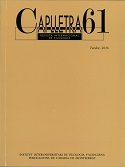Mirror symmetries in the internal order of absolute constructions: from Old Catalan to Contemporary Catalan
DOI:
https://doi.org/10.7203/caplletra.60.8457Keywords:
absolute construction, word order, left periphery, topic, grammaticalisation, adverbial subordination Abstract
Abstract
Abstract: Absolute constructions are supposed to display the main syntactic and interpretive properties of adverbial subordinate clauses but, in contrast to them, they lack any overt subordinating element. This article provides arguments against this hypothesis. On the basis of the argument fronting in Old and Modern Catalan, it will be claimed that absolute constructions introduced by una vegada and un cop in Catalan do have a subordinator which is compositionally built up from two discontinuous portions: on the one hand, a preposition which is incorporated in the sub-lexical structure of the participle, as proposed by Gallego & Hernanz (2012) and, on the other hand, a time expression (una vegada, un cop) that encodes an anteriority value with respect the event taking place in the main clause. Key words: absolute construction, word order, left periphery, topic, grammaticalisation, adverbial subordination.
 Downloads
Downloads
Downloads
Published
How to Cite
-
Abstract655
-
PDF (Català)435
Issue
Section
License
Authors submitting work to Caplletra for publication must be the legitimate holder of the usage rights. Legitimacy for the purposes of publishing the work must also include images, tables, diagrams and any other materials that may complement the text, whether they are the author of such material or not.
Copyright: on publishing their work in the journal, the author grants Caplletra. Revista Internacional de Filologia usage rights (reproduction, distribution and public communication) for both the paper printed version and for the electronic version.
All work published in Caplletra is covered by the Creative Commons license type Attribution-NonCommercial-NoDerivatives 4.0 (CC BY-NC-ND 4.0).
RESPONSABILITY
Caplletra. Revista Internacional de Filologia does not necessarily identify with the points of view expressed in the papers it publishes.
Caplletra. Revista Internacional de Filologia accepts no responsibility whatsoever for any eventual infringement of intellectual property rights on the part of authors.






